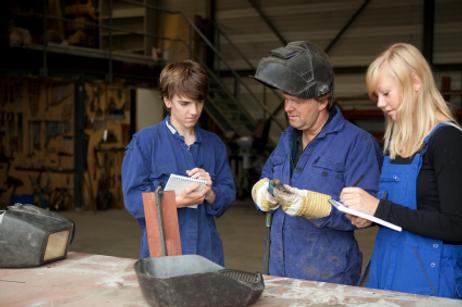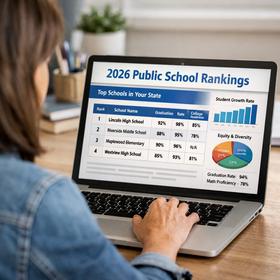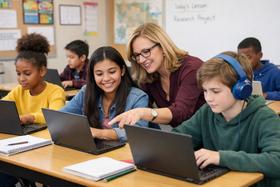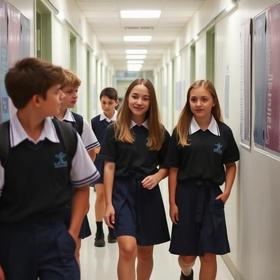With a seemingly intense focus on standardized tests and rote memorization, are public schools effectively preparing kids for the "real world" beyond high school boundaries? The answers may be troubling.
In fact, nearly 82 percent of college students report that if their secondary educational experiences had established higher standards, they would have happily exerted more rigorous efforts as students. Additionally, as the National Governors Association reveals, approximately 65 percent of current high school students desire more demanding and interesting courses.
As schools struggle to meet academic expectations while simultaneously adjusting to budget cuts, are public school students currently lacking a sound preparedness for life after graduation?
Are Tests Helping Students Gain Relevant Experience?
In an attempt to boost the performance of all public schools, federal legislation implemented the No Child Left Behind act. This act, established nearly a decade ago, mandated increased student testing in order to verify the effectiveness of each individual public school's progress and instructional practices. While this act had ideal intentions, many have realized that the initiative merely distracted students from learning, while emphasizing a new focus on testing and progress scores.
An American Diploma Project, Achieve is one of the leading programs striving to foster real-world readiness among public school students. As Achieve reveals, "To close the expectations gap and better prepare students for college and the workplace, states must first ensure that high school standards reflect the real-world skills and knowledge students need to be successful after they graduate." As the academic standards of public schools drive the goals and focuses of both teachers and students, Achieve argues that colleges and universities must collaborate with public institutions in order to clarify the skills and knowledge that is essential for real-world success. Adding to this, Achieve further asserts that employers must all be clear and open about what is mandatory to compete and excel in the expanding global economy.
With this path, Achieve asserts that nationally aligned standards will foster a more beneficial curriculum and assessment experience for students. Optimistically, there are currently 23 states that have career-ready standards, while an additional 21 states are already in the process of mirroring such real-world readiness agendas.
This TEDTalk explains how to prepare students for life.
Programs for Preparedness
Alongside Achieve's focus on aligning standards and curriculum standards, many public school programs and leaders are seeking out powerful, engaging, and challenging ways to boost their students' preparedness for the real world. In fact, one of the most popular programs that can foster greater real-world readiness is Advanced Placement (AP) courses offered at nearly all public school institutions.
Typically catering to advanced sophomores, juniors, and seniors, AP courses offer a unique and challenging opportunity to improve a student's engagement with academic materials. As the College Board explains, AP courses not only serve to effectively challenge and mature a student's intellect but also provide students with an opportunity to earn college credit towards their continuing education! With over 30 diverse courses spanning multiple subjects, AP course studies prove that students who engage in AP subjects in high school can more effectively excel in college and future pursuits. Specifically, the College Board reveals optimistic data reports, such as:
- Students with passing AP Course Test results are able to earn college credit (free of tuition costs) towards classes at over 90 percent of the United States' colleges.
- Students who pursue AP courses in high school are able to complete their college education in a shorter period of time. Similarly, with the extra time provided by the proactive AP course efforts, many students are able to even pursue a double major in college.
- Students with AP courses on their high school transcripts stand out in the college admissions evaluation procedures, as AP course enrollment reveals a student's maturity, readiness for college, and a commitment to academic excellence.
- Students who engage in AP courses have higher rates of attending advanced education institutions.
While there are certainly clear benefits to the instructional and classroom opportunities in AP courses, students are most notably able to gain perks from the various high-level skills that are reinforced throughout such courses. For example, students in AP courses are able to achieve an early start on their college-level assignments and subjects, are able to improve their writing while increasing their critical thinking abilities, and are ultimately able to gain the essential habits that are required to compete in college and a professional environment.
This video discusses success in school versus success in life.
What About Real-World Work Preparedness?
As the St. Petersburg Times reveals, the biggest problems with public schools rest upon the fact that the 160-year-old model of education has not been reinvented. Expounding upon this argument, "We have been delivering education the same way since public education began in the mid-1800s. Students come to school to learn to read, write, add, subtract, and become good citizens." Critics of the current public educational practices point attention towards the nearly 80 percent of Americans who will not earn a college degree. As a result, many are forced to question "what are public schools doing to prepare the majority of kids who will not continue on towards college?" As the St. Petersburg Times additionally asserts, amidst our economic struggles, public schools have a responsibility, now more than ever, to re-evaluate the goals and practices of its programs. Ultimately, "To reinvent education, we need to rethink our goals. In economic times like these, we need to make sure this generation is ready to work."
Nearly mirroring a response to the protests of the St. Petersburg Times, Austin paper The Statesman reports that its local public school is beginning to offer revised curriculum programs and opportunities. Students attending Austin public schools can engage in a new "Raise Your Hand" proposal. With this measure, students are able to pursue one of three unique pathways to earn a high school diploma. As such, students can choose a traditional college-prep program, which is similar to the current nation-wide high school pathway. Yet, in addition to this choice, students who are more interested in electives in the fine arts can engage in the mandatory class requirements alongside an emphasized focus on their specific fine arts interests (including increased music classes, advanced art, and theater classes). Finally, students who are hoping to pursue a career in the technical and/or industrial sectors can enroll in the mandatory classes while simultaneously engaging in a pathway that emphasizes work-place preparedness.
Ultimately, while Austin school leaders assert that they desire all of their students to attend college, the supporters of this program claim that the various curriculum-pathways allow students to engage in college, creative, and/or work-place preparedness, ensuring that all local Austin graduates obtain real-world skills upon earning their high school diplomas.
As our economy and society continue to evolve, public schools must adjust to meet the changing needs. Ensuring that students are prepared for the real world outside of academia is an important step.
Questions? Contact us on Facebook @publicschoolreview.















